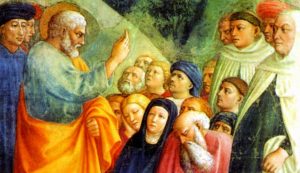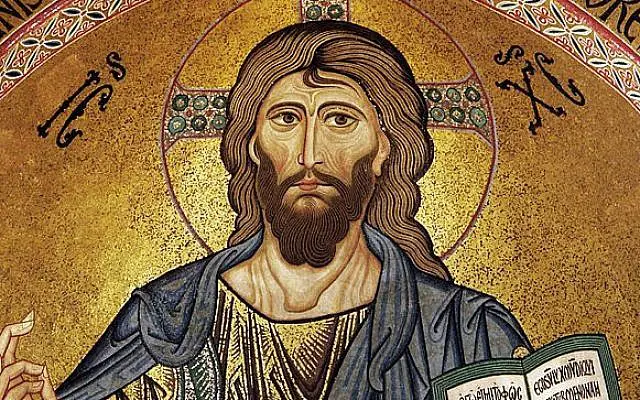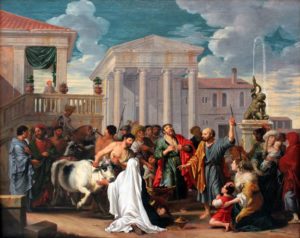Those who believe in the preexistence of Jesus look to passages such as 1 Peter 1:10-11 to prove their position.
1 Peter 1:10-11 (NASB) As to this salvation, the prophets who prophesied of the grace that would come to you made careful searches and inquiries, 11seeking to know what person or time the Spirit of Christ within them was indicating as He predicted the sufferings of Christ and the glories to follow. (emphasis added)
They posit that the title Spirit of Christ represents a preincarnate Jesus and since the Spirit of Christ was speaking to Old Testament prophets at a time that predated Jesus’ birth, it means that Jesus preexisted as deity. They hold this belief even though the phrase Spirit of Christ is never used in the Old Testament. It is only after God raised Jesus from the dead and exalted him to His right hand that we see the term used. After the outpouring of the Holy Spirit on the Day of Pentecost, Spirit of Christ is used to express the ministry of the Holy Spirit, sent by God through the exalted Christ. Thus, at the heart of this argument is a misunderstanding of what the phrase Spirit of Christ means in 1 Peter 1:10-11.
In this article, we will examine what the phrase Spirit of Christ means in the context of Peter’s epistle. We will also look to Peter’s Christology to help us arrive at a Biblical understanding of who the apostle believed Jesus to be.
Spirit of Christ
Scripture speaks of the Spirit of God (the Father), the Spirit of Christ, and the Holy Spirit.[1] Moreover, each Spirit is said to be in believers.[2]Yet the Bible also emphasizes that there is just one Spirit. For example, the apostle Paul wrote to the church in Ephesus that, “There is one body and one Spirit” and that through Jesus, we have access to the Father in “one Spirit”.[3]
How is it that there is more than one Spirit spoken of and yet there is only one Spirit? The answer lies in the fact that these, and other phrases like Spirit of Jesus, Spirit of Christ, Spirit of your Father, Spirit of His Son, Spirit of Holiness, etc., are all references to the Holy Spirit.

Why then does Peter refer to the Holy Spirit as the Spirit of Christ in this passage? It is because the message that was being proclaimed to the Old Testament prophets by the Holy Spirit pertained to the coming Messiah or Christ. In like manner, other Biblical authors refer to the Spirit in ways that reflect various aspects of its work or ministry. For example, the Bible uses the phrase spirit of adoption when speaking of how God has become our spiritual Father,[4] the spirit of grace when referencing God’s grace,[5] the spirit of truth when speaking of divine revelation,[6] and the spirit of wisdom when relating God’s wisdom to man.[7] So, it is in keeping with Biblical norms for Peter to write Spirit of Christ when speaking of prophetic messages regarding the coming Christ. Indeed, the apostle uses this literary technique later in the same epistle when he writes of the spirit of glory and of God.[8] Thus, the term Spirit of Christ is not a reference to a preincarnate Christ, but to the Holy Spirit.
Regarding the term Spirit of Christ in 1 Peter 1:11, the ESV Global Study Bible agrees when it notes that:
The OT prophets did not know when their prophecies would come true, but they did foretell that Christ would suffer and then be glorified. The Spirit of Christ is the Holy Spirit, who was speaking through the prophets.[9] (emphasis added)
The context of 1 Peter 1:10-12 further relates that the Spirit was involved, not only in the ministry of the OT prophets but also in the lives of those who preached the gospel to his first-century audience:
1 Peter 1:10-12 (NASB) As to this salvation, the prophets who prophesied of the grace that would come to you made careful searches and inquiries, 11seeking to know what person or time the Spirit of Christ within them was indicating as He predicted the sufferings of Christ and the glories to follow. 12It was revealed to them that they were not serving themselves, but you, in these things which now have been announced to you through those who preached the gospel to you by the Holy Spirit sent from heaven—things into which angels long to look. (emphasis added)
He Predicted
Some may persist that the Spirit of Christ refers to a preincarnate Jesus because verse 11 says “He predicted…” meaning that the use of the pronoun he is a reference to Jesus. However, the masculine third person pronoun is not in the original language but was added later by some English translators (NASB, NIV, ESV, etc.). In fact, the pronoun associated with the verb predicted (Greek promartyromenon – to say or testify beforehand) and its antecedent Spirit, is neuter, not masculine, and should be translated as it. Everett’s Study Notes confirms this assessment:
The neuter personal pronoun “it” in this statement refers to the Holy Spirit as its antecedent since the Spirit is a neuter word in the Greek text.[10]
By rendering the neuter pronoun as He, instead of it, and by capitalizing the word, the translators have extended their bias regarding the Spirit to the reader. (See this article for more on pronouns and the Holy Spirit.)
On the other hand, translations like the KJV, American Standard Version, English Revised Version, and others properly render the pronoun as it. Still, other translations, like the Berean Literal Bible, translate the verse without a pronoun.
Peter’s Christology in 1 Peter and Beyond
Did Peter believe Jesus was God and that he preexisted in heaven? We have only to look to Peter’s Christology in the opening verses of chapter one to discover that the apostle understood God to be the Father and Jesus to be Lord and Christ.[11]
1 Peter 1:1-3 (NASB) Peter, an apostle of Jesus Christ, to those who reside as strangers, scattered throughout Pontus, Galatia, Cappadocia, Asia, and Bithynia, who are chosen 2 according to the foreknowledge of God the Father, by the sanctifying work of the Spirit, to obey Jesus Christ and be sprinkled with His blood: May grace and peace be multiplied to you. 3 Blessed be the God and Father of our Lord Jesus Christ, who according to His great mercy has caused us to be born again to a living hope through the resurrection of Jesus Christ from the dead (emphasis added)
It is important to note that Peter made a distinction between God and Jesus. To be sure, he taught that God the Father is the God of Jesus. In addition, Peter never states anywhere in Scripture that Jesus preexisted in heaven with God. Instead, in this same epistle, the fisherman-turned-apostle states that God foreknew Jesus.
1Peter 1:20 (NASB) For He [Jesus] was foreknown before the foundation of the world, but has appeared in these last times for the sake of you (emphasis added)
Peter could have easily written that Jesus preexisted if that had been the case. But he did not. Instead, he wrote that God knew about the Christ before He created the world. In case some equate foreknowledge with literal preexistence, consider that Peter also wrote that the recepients of his letter were chosen according to God the Father’s foreknowledge:
1 Peter 1:1-2 (NASB) Peter, an apostle of Jesus Christ, To those who reside as strangers, scattered throughout Pontus, Galatia, Cappadocia, Asia, and Bithynia, who are chosen 2 according to the foreknowledge of God the Father, (emphasis added)
Does this foreknowledge mean those who resided in Pontus, Galatia, Cappadocia, Asia, and Bithynia preexisted in heaven? Certainly not. In like manner, God foreknew about us before we were born, but most would not argue that we literally preexisted.
Psalm 139:15-16 (NASB) My frame was not hidden from You when I was made in secret, And skillfully formed in the depths of the earth; 16 Your eyes have seen my formless substance; And in Your book were written all the days that were ordained for me, when as yet there was not one of them.
Romans 8:29 (NASB) For those whom He foreknew, He also predestined to become conformed to the image of His Son, so that He would be the firstborn among many brothers and sisters; (emphasis added)
Romans 11:2 (NASB) God has not rejected His people whom He foreknew. Or do you not know what the Scripture says in the passage about Elijah, how he pleads with God against Israel? (emphasis added)
Peter shared this same truth about God’s foreknowledge of the Christ when he preached to the Jerusalem crowd on Pentecost:
Acts 2:22-23 (NASB) “Men of Israel, listen to these words: Jesus the Nazarene, a Man attested to you by God with miracles and wonders and signs which God performed through Him in your midst, just as you yourselves know— 23 this Man, delivered over by the predetermined plan and foreknowledge of God, you nailed to a cross by the hands of godless men and put Him to death. (emphasis added)

Peter taught that God had a predetermined plan to send the Christ. He foreknew that the Christ would suffer and die. This plan was fulfilled in the man, Jesus of Nazareth. If Jesus had preexisted as God in heaven, this would have been the perfect time—the advent of the Church on the Day of Pentecost—to share such revelation. But Peter did not then, nor did he ever, mention it. That is because the literaly preexistence of Jesus in heaven was a post-Biblical development.
In conclusion, the term Spirit of Christ found in 1 Peter 1:10-11 does not affirm the post-Biblical doctrine of preexistence. Instead it is a phrase used to speak of the ministry of the Holy Spirit as it relates to the Christ. Peter never taught that Jesus prexisted as God in heaven, but rather that Jesus was a man from Nazareth who fulfilled Old Testament prophecy as an obedient servant of his God and Father.
(You can learn more about Peter’s Christology as recorded in the New Testament in these articles.)
[1] Scripture records a variety of similar expressions: Spirit of God, Spirit of your Father, Spirit of Jesus, Spirit of His Son, Spirit of Holiness, etc.
[2] For example, Romans 8:9-10; 1 Corinthians 3:16 and 6:19; Acts 2:4 and 4:31.
[3] Ephesians 4:4 and 2:18 respectively. See also 1 Corinthians 12:4, 9, 11, and 13.
[4] Spirit of adoption (or spirit of sonship in some translations), see Romans 8:15
[5] Spirit of grace, see Zechariah 12:10 and Hebrews 10:29.
[6] Spirit of truth, see John 14:17 and 16:13.
[7] Spirit of wisdom, see Exodus 35:31; Deuteronomy 34:9; Isaiah 11:2; Ephesians 1:17, etc.
[8] Spirit of glory and of God, see 1 Peter 4:14.
[9] ESV Global Study Bible, 1 Peter 1:10-11, The Blue Letter.
[10] Everett’s Study Notes on the Holy Scriptures, StudyLight.org
[11] Jesus was not inherently Lord or Christ, rather God made or appointed him to these roles. See Acts 2:36.




